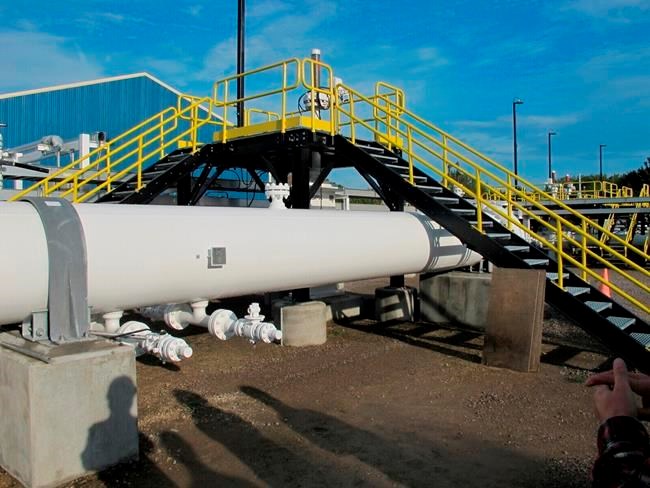WASHINGTON — A Wisconsin judge ordered a Canadian energy giant and a U.S. Indigenous band to water down their wine Monday and come together to avert the "draconian" shutdown of the cross-border Line 5 pipeline.
A compromise between Alberta-based Enbridge Inc. and the Bad River Band of the Lake Superior Chippewa would be less than ideal, "particularly in the longer run," District Court Judge William Conley said in a written opinion.
But on balance, Conley suggested, it would be better than the options before the court now: permanently severing a vital conduit between the two countries or courting an environmental disaster that may only be a matter of time.
The potential options the band has currently put before the court, if granted, would effectively amount to an "automatic, permanent shutdown" of the pipeline, the judge said.
"Before adopting such draconian injunctive remedies, therefore, the court must consider what alternative steps, however imperfect ... would reduce the risk of an oil spill in the near term," he wrote.
If at all possible, Conley continued, those steps should also preserve the operation of Line 5 "for those areas of the United States and Canada that currently depend on it."
Conley ruled in September that the Bad River band was within its rights to revoke permission for the pipeline to cross its territory back in 2013, and that Enbridge should have known it did not have a guarantee it would continue to operate.
In that ruling, he refused to order the pipeline shut down immediately, citing "widespread economic consequences" and "significant public and foreign policy implications."
But Monday's order — which requires the two sides to meet by Dec. 17 in an effort to broker a solution — also makes clear that the court "will continue to consider the band's request for injunctive relief."
Conley acknowledged in the order that the band's own natural resources officials have already considered other options and given their reasons for refusing to agree to them.
But the band "appears to have failed to weigh the flaws in those alternatives against the risk of a possible pipeline failure" in the event the pipeline is allowed to keep operating, even temporarily, he said.
None of Enbridge's proposals provide "permanent solutions" to a possible failure, short of a complete reroute, he wrote. But "each at least appears to forestall that risk at relatively limited costs to the band's natural resources."
Conley also rejected outright the company's counterclaims, which allege that the band has refused to allow them access to the territory in order to conduct inspections and maintenance on the pipeline.
"The court is not convinced by any of Enbridge's arguments."
Those included a request for an injunction under a 1977 pipeline treaty that's expressly intended to prevent the interruption of the flow of energy between Canada and the U.S.
Foreign Affairs Minister Mélanie Joly has already invoked that treaty in Wisconsin, and talks between the two countries have been ongoing for nearly a year in connection with a similar case in Michigan.
But Enbridge doesn't have any power in court under that treaty, which already allows "appropriate governmental authorities" to regulate cross-border pipelines in their jurisdiction, Conley wrote.
Central to the band's case is the area where the pipeline crosses a "meander" in the Bad River — where heavy erosion and the risk of a flood make it the most likely location of a potential break in the line.
"The negative impact in this area on the Bad River watershed and even Lake Superior itself could be catastrophic," Conley wrote, adding that a rupture "would be a substantial and unreasonable interference with the band's and the public's rights."
That said, he continued, "the band has yet to prove its right to an immediate entry of injunctive relief."
Enbridge has already promised to reroute the pipeline around the reservation, and Conley signalled back in September that the court is "inclined" to order that rerouting be completed within the next five years.
That hasn't satisfied the Bad River band, however, which still wants the pipeline shut down in the interim.
In a statement, Enbridge acknowledged the latest order and said it was willing to work towards a viable solution.
That could include "reasonable remediation projects, the installation of emergency valves on the reservation, as well as an appropriate plan for shutting down and purging Line 5 if the meander worsens," the company said.
"We look forward to meeting with the Bad River band to discuss these issues. In the meantime, Line 5 will continue to safely operate."
Environmental concerns about Line 5 have long been top of mind in Wisconsin, where the pipeline runs directly through the Bad River Reservation, more than 500 square kilometres of pristine wetlands, streams and wilderness.
The band has been in court with Enbridge for more than three years, arguing that the company is trespassing, having violated the terms of the easements that allowed the pipeline to traverse the reservation beginning in 1953.
The company says its plans for a 66-kilometre detour of Line 5 around the reservation are already two years along, with 100 per cent of private landowners along the new route having already signed agreements.
Line 5 is also under legal siege in neighbouring Michigan, where the state wants the line shut down for fear of a disaster in the Straits of Mackinac, the ecologically delicate area where it crosses beneath the Great Lakes.
Business groups and chambers of commerce on both sides of the border, provincial governments and Ottawa have all rallied behind Enbridge in its effort to portray Line 5's survival as a mission-critical matter of continental energy security.
Allies have argued in court filings as well as public forums that Line 5 is a vital source of energy for several Midwestern states, and an essential link for Canadian refineries that fuel some of Canada's busiest airports.
This report by The Canadian Press was first published Nov. 28, 2022.
James McCarten, The Canadian Press



